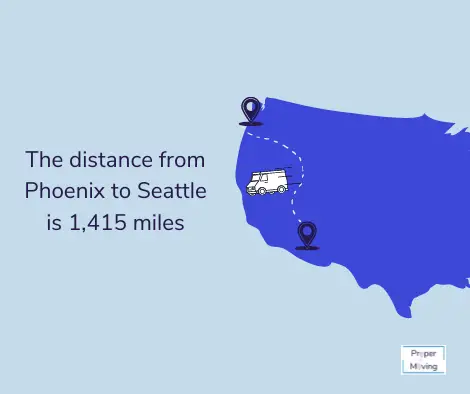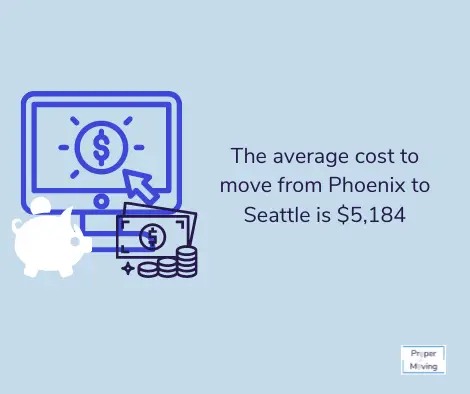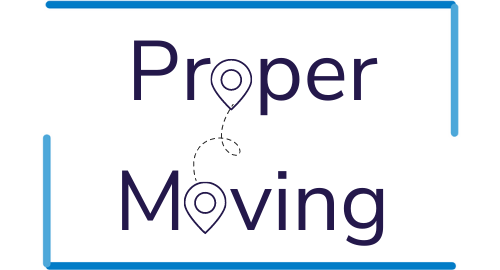Moving from Phoenix to Seattle can bring about some change, so you’ll want to do some research on your new city before planning to move.
Most of the differences between living in Phoenix and living in Seattle are weather-related.
But the good news is that if you loved all the outdoor activities and national parks available to you around the Phoenix area, Seattle will offer the same range of outdoor activities, just without the desert heat.
These similarities may help you to adapt to life in Seattle promptly, and hopefully, this guide will assist you in verifying whether or not trading the Valley of the Sun for The Emerald City is the right choice for you.
The Moving Process From Phoenix to Seattle
How Far is Seattle from Phoenix?
The distance between Phoenix and Seattle is 1,415 miles. The driving time of this journey is approximately 22 hours by car depending on traffic.

This drive is quite long, so you may want to consider hiring a professional moving company to move your things for you. If you do decide to drive to Seattle and allow the moving company to take care of the moving part, you would pass through Las Vegas on the way and you could make a road trip out of it.
The flight time is roughly 3 hours long, so if 22+ hours of driving sounds rough to you, flying would be the best option for you.
What is the Average Cost to Move From Phoenix to Seattle?
The average cost to move from Phoenix to Seattle is between $3400-$7000. That means on average it costs roughly $5,184.

To determine the exact cost of a move from Phoenix to Seattle, a few factors must be considered.
These include whether you will need to ship your car cross-country rather than driving it to Seattle, the quantity of the items you plan to move, whether you add services like packing and unpacking to your professional move or whether you plan to ship the majority of your items and fly there instead.
Should I Move From Dallas to Seattle?
While this move won’t require a massive change with regards to the quality of life, there are benefits to move to Seattle.
Milder weather and an environmentally friendly city are two of the biggest benefits. If this sounds good to you, then you should move from Phoenix to Seattle.
How Phoenix Compares to Seattle
Living Costs Compared
When moving from Phoenix to Seattle, you will notice that the cost of living in Seattle is much higher than in Phoenix. People in Seattle make roughly 12% more than your average American, so this helps to counterbalance the higher cost of living.
In Phoenix, the median rent for a 2 bedroom apartment is around $1,533. While in Seattle, you can expect the median rent for a 2 bedroom apartment to be around $2,724.
Buying a home in Seattle can be 2.3 times more expensive than it is in Phoenix. The median sale price of a 3 bedroom house in Phoenix is roughly $346,409. Meanwhile, in Seattle, you can expect to pay $826,200 for a 3 bedroom house.
Additonally, you can also expect to pay more for food, transportation, and healthcare in Seattle.
Public Transportation
King County Metro is the primary method of public transportation in Seattle, it consists of a vast network of buses that connects the suburbs to Downtown Seattle.
Sound Transit offers light rail and commuter trains and links to King County Metro to help connect the wider area of Washington State with the City of Seattle.
Seattle is located on the Puget Sound, so ferries and water taxis are often used as public transport when one needs to cross the water. Seattle’s ferry system is efficient and you can walk or drive onto most ferries operating in the area.
In Phoenix, a 31-Day Pass for Local Bus and Light Rail costs only $64 and one ride costs $2.00. But in Seattle, a monthly pass for the King County Metro is $99, and a one-way ticket is $2.75.
Weather
As you already know, the weather in Seattle differs hugely from the weather in Phoenix. Both cities enjoy hot summers, but Seattle has fewer sunny days year-round.
Seattle has a reputation for being a rainy place and Seattle averages 38 inches of rain per year while Phoenix gets around 9 inches per year.

Phoenix gets no snow during the winter months, so if you like the idea of spending the winter on the slopes, you’ll be happy to hear that you’ll be able to ski and snowboard in Washington State.
The summers in Seattle are milder, which is great if you want to spend the day at the lake or go on a hike. So if you are not a fan of the desert heat in Phoenix, Seattle might suit you better.
Moving From Phoenix to Seattle DMV
If you plan on moving from Phoenix to Seattle, you’ll need to obtain a new driver’s license.
You’ll have 30 days to get a WA driver’s license from the time you become a resident in Washington State. After you receive your new license, you must then register your vehicle.
There are different locations for driver and vehicle licensing so you must make two separate trips.
If you would like to know more about the process you can find the information here.
Buying a Home in Seattle
As we mentioned previously, buying a home in Seattle is noticeably more expensive than buying a home in Phoenix.
Don’t let this scare you from buying a home in Seattle, the city has 100 distinct neighborhoods to choose from so you’ll have plenty of places to look for the ideal neighborhood to call home.

If you’re wondering where to begin your hunt, the following neighborhoods are an excellent place to start house hunting
West Seattle
Are you looking to buy a house in a neighborhood that’s safe for your family? West Seattle offers an abundance of affordable housing options suitable for expanding families.
It’s located on its own peninsula so you can expect lots of opportunities for outdoor activities with the kids.
The public schools in West Seattle are highly rated, which is great if you have school-going children. The area is 59% safer than other Seattle neighborhoods, so you can expect the crime rates to be super low.
If you love community events, you’re in luck because West Seattle hosts a wide range of events for the community year-round.
Capitol Hill
If you’re looking for an eclectic, busy neighborhood to call home, Capitol Hill is for you! This historic neighborhood was a haven for the counterculture community in the middle of the 20th century, this influenced many LGBTQ people who were seeking community acceptance to move here.
It is now a lively and vibrant district packed with trendy indie stores, hip coffee shops, and entertainment clubs. So if this sounds like your scene, make sure to check out the houses for sale in Capitol Hill.
Fremont
If location matters to you, Fremont is a great neighborhood to consider. It’s relatively close to Downtown Seattle but still has a suburban feel to it. The neighborhood attracts a young working crowd since Adobe and Google both have offices in the area.
The housing stock in the area is made up of bungalows, Craftsman-style homes, and spacious condos. Fremont hosts a Farmers Market every Sunday, so if you love the idea of buying your apples and raspberries from a small produce stand on a Sunday morning, this neighborhood is for you!
Selling Your Property in Phoenix
The initial step when planning to sell your home in Phoenix is finding a suitable realtor. Then you must figure out the correct time to sell your home, which will help you make a quick and profitable sale.
The housing prices in Phoenix can fluctuate depending on the time of year that you list and sell your home. November is the best month to sell your home, and it usually takes around 3 months to close on a sale in Phoenix. Therefore, you should try and list your house in August. If you do this, you can expect to make nearly 4.6% more than you would make at any other time of the year.
Before listing your home, you must figure out how much your house is worth. If you’ve hired a competent realtor, they’ll be able to compare your house to your area’s market value and gauge your property’s value from that.
Subsequently, they should be able to advise you on the necessary steps needed to complete the sale. Which will hopefully allow you to focus solely on the relocation, and help alleviate some of the stresses that come with selling property.
Finding a Job in Seattle Before You Move There
If you are planning to move to Seattle, it’s worth taking note that Seattle is home to 5 Fortune 500 companies, such as Starbucks, Nordstrom, and Amazon.com.
Seattle’s economy is steered by a mix of old and new companies, and this diverse range has created a reliable job market that caters to a wide assortment of people. The preferred places to start the job hunt in Seattle would be;
City of Seattle Employment: Career Center
If you’re keen on securing a City of Seattle job, their career center lists lots of information on where residents can find job opportunities, mostly in the public sector.
Ten thousand employees work together to make the city of Seattle a better place, so if you’d like to know more, and maybe even become one of them, you can click here.
Indeed
Indeed is a great place to begin a job hunt, no matter what your industry. Use the tools to filter your search to your preferred area in Seattle, or you can try searching in nearby Puget Sound cities like Issaquah, Bellevue, and Redmond for even more job opportunities.
Check out the current job listings here.
Word of Mouth
Do you have friends or family living in Seattle? Reach out to them and ask them if they know of anyone that’s looking to hire.
Moving From Phoenix to Seattle Checklist
The checklist below can help you decide what needs to be done before trading the Valley of the Sun for The Emerald City
At Least 4 to 6 Weeks Before the Move
– Get in touch with reliable movers that will assist you in transporting your things from Chicago to Dallas.
– Get in touch with your family’s health care physician, dentist, and any other service providers that you are in contact with and let them know that you are moving.
– Order moving supplies or ask your moving company to provide them as an additional service
– It is a great idea to sell or donate your unwanted items. You can sell on Facebook Marketplace or Craigslist. Or you can donate them to the Salvation Army and they will pick items up at no charge.
– Begin packing; clearly mark boxes with a marker indicating which room they will be going into at delivery.
– You will need to make your change of address known to several different places, such as wherever you do your banking, the DMV, your workplace, any other financial institutions (such as credit card providers), the post office, your utility provider, and, saving the most important for last, your friends and family.
– Sort plane tickets if you’re planning to fly.
2 Weeks Prior to the Move
– It is imperative to clean and/or make needed repairs on your old home before moving out, since leaving your place an absolute mess may leave your security deposit in jeopardy.
– Because of the abundance of fragile items in your kitchen, you’ll want to pack these items away long in advance, with protective bubble wrap to ensure nothing gets broken in transit.
– You will also want to begin packing your things from bedrooms and bathrooms, except for your essential items that you will be using until you move.
– If necessary, you will want to arrange a babysitter for your kids and/or pets for parts of the move that you need to be able to focus and get things done.
A Couple of Days Before Your Move
– Clean up your home completely, double checking any cracks and crevices that may have your stuff hidden away.
– Unless your movers will do it for you, dissassemble your furniture to make your move a smoother process, and ensure to keep any screws, brackets, or other small items that are needed for reassembly. Pro tip: tape these smaller items in a bag to the bottom of the furniture.
– Print out the floor plan of your new home and have enough for the movers as well.
– You may want to hit the ATM before moving day, as you’ll need to have enough cash to tip your movers. Generally speaking, you’ll want to tip $20-$30 per mover.
– Make sure that you confirm with your movers the details of your move. The last thing that you want is to have moving day come around, and you and your movers aren’t on the same page.
– Get in touch with the landlord or current homeowner of your new place, and ensure that you’ll be able to get the keys to your new place when you arrive.
– Document the condition of your old place through pictures and videos, to ensure that you have proof of its state. This will come in handy if your landlord tries to keep your deposit, based on incorrect facts.
Moving Day
– Hand over your old home’s keys to the necessary people, such as landlord or building management.
– Do a quick run-through of your home to ensure that nothing gets left behind, whether it’s just a smaller item, or an entire box of stuff.
– Ensure that everything you packed up is in your new home before unpacking everything.
– If the moving company you are working with is going to assemble your furniture, make sure that they reassemble it in the correct room to avoid unnecessary work.
– Be sure to thank everyone helping you move, and leave them a tip!
You did it! Congrats and enjoy your new home!
RELATED POSTS:
Moving From Dallas to Seattle
Moving From San Diego to Phoenix
Moving From San Francisco to Portland


Hello would you mind stating which blog platform you’re working with? I’m looking to start my own blog soon but I’m having a tough time selecting between BlogEngine/Wordpress/B2evolution and Drupal. The reason I ask is because your design and style seems different then most blogs and I’m looking for something completely unique. P.S Apologies for being off-topic but I had to ask!